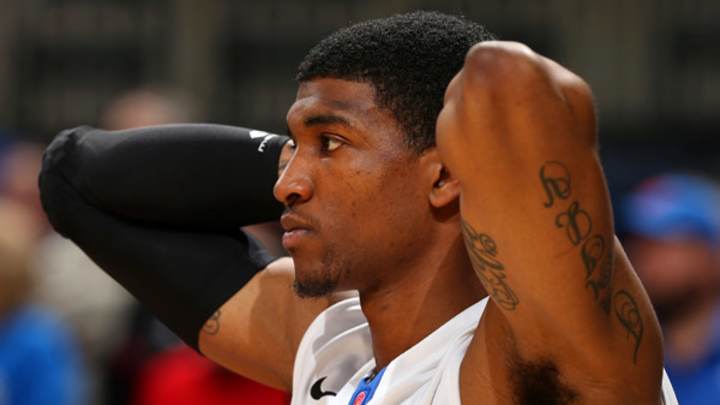Selection committee chair emphasizes schedule strength in SMU snub

SMU was left out of the NCAA tournament, and will instead have to settle for a No. 1 seed in the NIT. (Joe Murphy/Getty Images)

SMU was the last team left out of the NCAA tournament field. It was, selection committee chairman Ron Wellman said, a very difficult decision. But making the decision at least a fraction easier were numbers that suggested the Mustangs took the easy way out during non-conference action. And if there was an overriding message screamed clearly by the women and men filling out the brackets on Sunday, it was this: Play someone. Win, and that'll help immensely. But at least play somebody.
“In SMU's case, their downfall, their weakness, was their schedule,” Wellman said on a conference call Sunday night. “Their non-conference strength of schedule was ranked 302nd. It was one of the worst non-conference strength of schedules. Their overall strength of schedule ranked 129. That would have been, by far, the worst at-large strength of schedule going into the tournament. The next worst at large strength of schedule was 91. Really, the glaring weakness about SMU was their schedule.”
Hamilton & Thamel: Regional breakdowns
Consider it a manifesto for downtrodden coaches putting together slates for 2014-15 as they grumble about their postseason fates this season, one way or another. Winning was important, playing a rigorous schedule was important, and the combination helped or hurt teams depending on how they managed both. Kansas was a No. 2 seed, Wellman said, because a brutal non-conference test followed by the Big 12 grind earned them that spot, Joel Embiid or not. No. 1 seed Wichita State may not have been able to get as many quality games as it wanted, but it won all 34 that it did play, and was under greater consideration for the top overall seed than it was for a spot on the two-seed line.
And Wellman insisted what looked like a Group of Death assignment for a 34-0 team – the Shockers are joined by Michigan, Duke, Louisville and Kentucky, among others – was merely fair play.
Beller: Midwest region overrated, more bracket thoughts
“Certainly there are some great 'name' basketball schools in that region,” Wellman said. “But the competitiveness of the region is very, very balanced when you look at its entirety. The way we do that is to summarize the RPIs of the teams in that region, especially the first four lines. We have guidelines of how close the range should be in the first four lines. You look at the other regions, we feel they are very, very strong, too. I don't see a region that is exceptionally more difficult or easier than any other region. I think we have achieved balance.”
Wisconsin-Green Bay suffered as an at-large contender because of three wins against Division II teams, Wellman said – an acute agony since the Phoenix had to scramble for games when an event featuring Division I opponents fell through.
Keith: Breaking down, analyzing the No. 1 seeds
Louisville's thunderous finish to the season begat only a No. 4 seed because, Wellman indicated, what came before it wasn't spectacular. The Cardinals played two tournament teams in the non-conference – North Carolina and Kentucky – and lost both.
“You could easily predict that they're a national championship contender this year,” Wellman said. “But the committee's responsibility is to look at an entire body of work. When you look at their entire body of work versus everyone else's on the board, we felt they were slotted appropriately on the No. 4 line.”
Here were some other assorted thoughts from Wellman, Wake Forest's athletic director, on Sunday night:
On the last No. 1 seed: “If Michigan had won their championship, they would have been on the 'one' line. If Michigan and Virginia had both lost their championships, Villanova would have been on the 'one' line.”
On adhering to natural seeds thanks to new bracketing principles: “It's the first time in five years I've been on the committee, and even before that, that we've been able to honor the true seed line. We did not have to adjust a seed line for any team this year.”
On N.C. State as the last team in: “The positive factor for N.C. State was that they had three wins against top 50 teams away from home. Not only did they beat those top 50 teams, but they did it on the road. Road wins against top 50 teams are really, really impressive to the committee. That probably was the one factor that was most prominent.”
On valuing games equally, not just the last 10: “We look at the entire body of work, we continue to remind one another in the selection process that the games in November are as important as the games in March. While it may look like certain teams may receive favor for performance in March, we look at the entire resume before making a decision.”
On Kansas' No. 2 seed: “Kansas has had one heck of a season. Certainly Embiid's injury was taken into consideration. Injuries probably play more of a factor in the seeding of teams versus the selection of teams. But we believe that Kansas, even without Embiid, is very deserving of a No. 2 seed with the season it had.”
On Kentucky's No. 8 seed: “The factor that probably hurt Kentucky as much as anything is that they had two wins against tournament teams, both of which occurred in December. And they had 14 wins against top 100 teams, but the majority of those were in the 75 to 100 range.”
On how the committee considered the Marcus Smart suspension:
